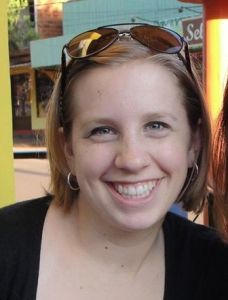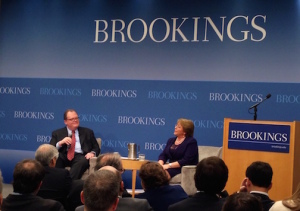 Emily graduated from the International Affairs program in May 2013. During college Emily majored in Spanish and Latin American Studies with a minor in Macroeconomics. She pursued courses along this trajectory at The New School while researching Argentina’s macroeconomic history with visiting labor economist Roxana Maurizio. This helped Emily prepare for the International Field Program in Buenos Aires where she interned at the UN Economic commission for Latin America and the Caribbean (ECLAC). At the UN ECLAC Emily researched the economic and urban factors at play in creating urban employment in Argentina. This experience led her to her current job with The Brookings institution where she provides event logistics and supports the director of the Latin America Initiative in foreign policy research.
Emily graduated from the International Affairs program in May 2013. During college Emily majored in Spanish and Latin American Studies with a minor in Macroeconomics. She pursued courses along this trajectory at The New School while researching Argentina’s macroeconomic history with visiting labor economist Roxana Maurizio. This helped Emily prepare for the International Field Program in Buenos Aires where she interned at the UN Economic commission for Latin America and the Caribbean (ECLAC). At the UN ECLAC Emily researched the economic and urban factors at play in creating urban employment in Argentina. This experience led her to her current job with The Brookings institution where she provides event logistics and supports the director of the Latin America Initiative in foreign policy research.
What was the outcome of an event that you helped organize at Brookings?
In February, we convened a round table on Central Americans displaced by criminal violence in which we brought together representatives from the US government, United Nations, NGOs, and academia. This is an issue that truly needs more research given rising levels of violence paired with a severe lack of data. Bringing these varied perspectives together had a real added value in beginning to understand where the holes are in our current knowledge, what the people on the ground know, and what the policymakers need to know to be more effective.
What interesting topics are you currently researching?
One research project I’m excited about is on Central American energy dynamics. Currently much of the energy Central America receives is subsidized from Venezuela (through Petrocaribe), however Venezuela’s increasing economic woes threaten the sustainability of this agreement. With the highest energy costs in the region and some of the poorest states, finding a way to lower energy costs would have huge positive ramifications on both a micro and macro level; families would have to spend less on energy and overall economic competitiveness would improve.
 What is a specific aspect of your job you really enjoy?
What is a specific aspect of your job you really enjoy?
One of the reasons I love working at Brookings is because we’re really situated at the intersection of policy and research. The new research we undertake attempts to fill gaps or improve the quality of research on a subject that is of interest to policymakers. We also don’t think we have all the answers; that’s part of Brookings’ convening role – we bring in other experts and draw on their knowledge as well.
What experience at Milano has most influenced you?
Terra Lawson Remer’s Development Economics class. I appreciated her policy focus and her challenge to us to write concisely – she would give us 2-3 pages in which to summarize, analyze, question, and present our opinion on hundreds of pages of reading. It certainly made you value each word you wrote. 100 page reports are important, but policymakers don’t have time to read them, so you have to be able to summarize the things they need to know in a page or two.
She would also often ask us, why should the US government care? It wasn’t enough to say, because it’s good for the people of so-and-so country. You had to be clear why the US should commit its limited resources to the issue and also think carefully about what, if anything, the US could actually achieve unilaterally. At Brookings, we often target our policy recommendations toward the US government and for them to be taken seriously, we have to make a good case; I keep asking myself those questions Terra asked me.
Where do you see yourself in 5 years?
Well that’s the million-dollar question, no? Right now my work is focused on foreign policy. Though I’m learning a lot from being around political scientists, I’m a macroeconomics at heart so I think I’d like to return to a focus on economics eventually. That might entail a PhD in development economics, but we’ll see.




